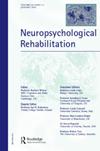Development and content validity of the cognition in daily life scale (CDL).
IF 1.7
3区 心理学
Q4 NEUROSCIENCES
引用次数: 0
Abstract
Cognitive impairment can negatively influence daily functioning. Current cognitive measures are essential for diagnosing cognitive impairment, but findings on these tests do not always represent the level of cognitive functioning in daily life. Therefore, this study aimed to design a structured measurement instrument to observe and rate the impact of cognitive impairment in daily life, named the cognition in daily life scale for persons with cognitive problems (CDL). In this paper we describe the development, expected usability, and psychometric properties (content and face validity) of the instrument. The CDL was established through three consecutive development phases: (1) item selection, (2) item categorization and comparison, and (3) item revision and manual construction. Subsequently, a panel of eleven international experts rated the relevance of the selected items and provided comments on the expected usability and face validity. Content validity was estimated with the content validity index, based on which four items were removed. The experts' comments led to minor adjustments of the manual, domains, and formulation of the maintained items. The final instrument consists of 65 items describing behaviour that relies on cognitive functions within six domains. Future research should focus on evaluating the construct validity and reliability of the CDL.日常生活认知量表(CDL)的开发和内容有效性。
认知障碍会对日常功能产生负面影响。目前的认知测量方法对诊断认知障碍至关重要,但这些测试结果并不总能代表日常生活中的认知功能水平。因此,本研究旨在设计一种结构化的测量工具来观察和评价认知障碍对日常生活的影响,并将其命名为认知障碍患者日常生活认知量表(CDL)。在本文中,我们将介绍该工具的开发、预期可用性和心理测量特性(内容效度和表面效度)。CDL 的建立经历了三个连续的开发阶段:(1) 项目选择;(2) 项目分类和比较;(3) 项目修订和手册编制。随后,一个由 11 位国际专家组成的小组对所选项目的相关性进行了评定,并就预期的可用性和面效度提出了意见。根据内容效度指数对内容效度进行了评估,并在此基础上删除了四个项目。根据专家的意见,对手册、领域和保留项目的表述进行了微调。最终的工具由 65 个项目组成,描述了六个领域内依赖认知功能的行为。未来的研究应重点评估 CDL 的构建效度和信度。
本文章由计算机程序翻译,如有差异,请以英文原文为准。
求助全文
约1分钟内获得全文
求助全文
来源期刊
CiteScore
6.30
自引率
7.40%
发文量
78
审稿时长
>12 weeks
期刊介绍:
Neuropsychological Rehabilitation publishes human experimental and clinical research related to rehabilitation, recovery of function, and brain plasticity. The journal is aimed at clinicians who wish to inform their practice in the light of the latest scientific research; at researchers in neurorehabilitation; and finally at researchers in cognitive neuroscience and related fields interested in the mechanisms of recovery and rehabilitation. Papers on neuropsychological assessment will be considered, and special topic reviews (2500-5000 words) addressing specific key questions in rehabilitation, recovery and brain plasticity will also be welcomed. The latter will enter a fast-track refereeing process.

 求助内容:
求助内容: 应助结果提醒方式:
应助结果提醒方式:


